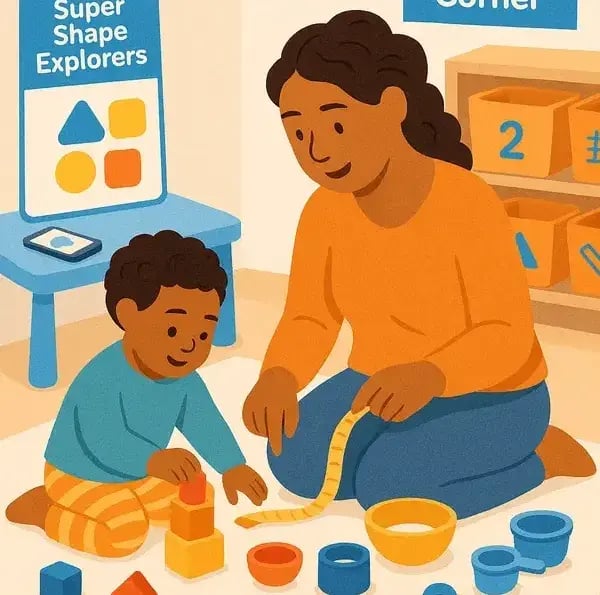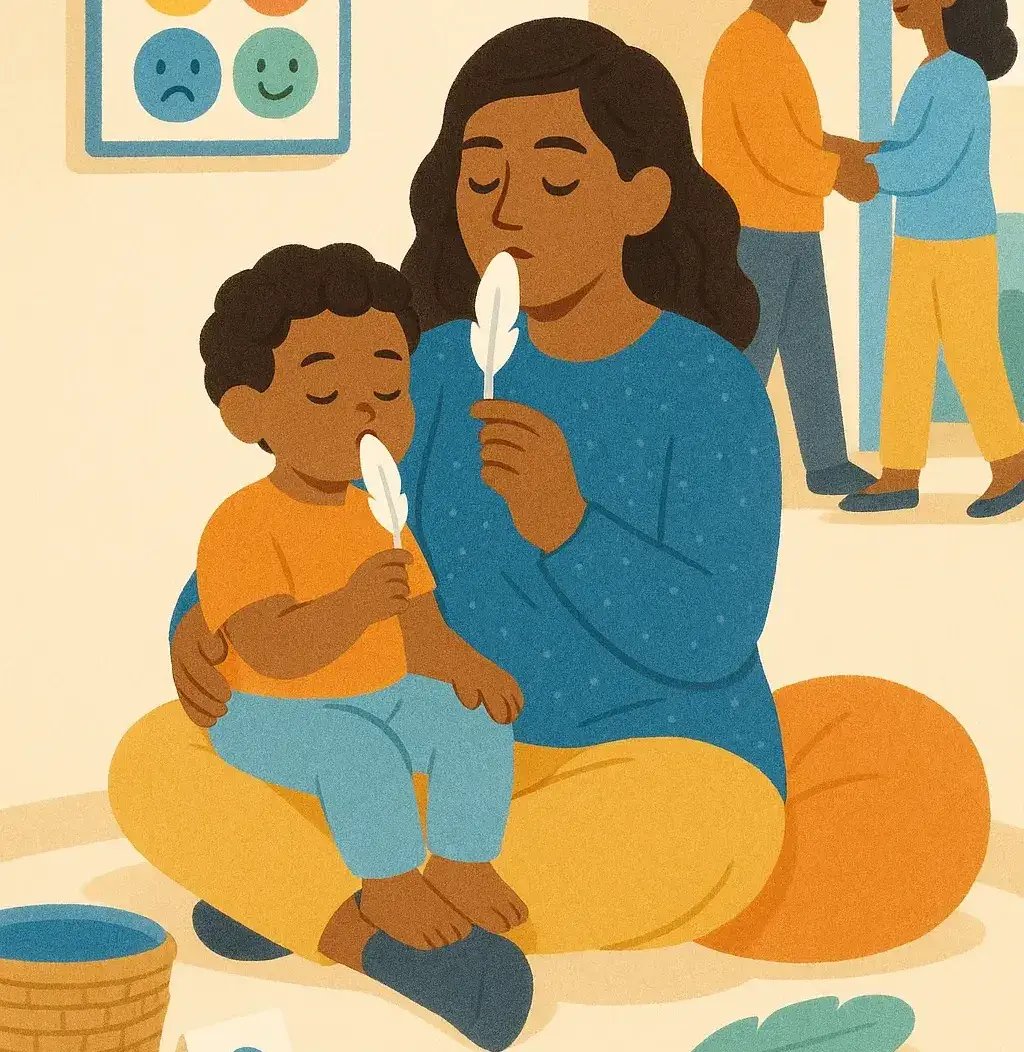Babyzone Programmes
Parents are the first and most important educators. Each Babyzone hub delivers our flagship programmes and a mix of evidence-informed sessions designed to strengthen early learning, wellbeing and confidence - at home and in the community.
Our Flagship Programmes

Babyzone Everyday Maths
Everyday Maths is a 40‑week pathway that makes maths visible in everyday routines. Activities follow a clear content spine across early maths domains, including number, shape and space, measurement, data and patterns. Sessions like Super Shape Explorers and the Maths Corner turn play into learning, then travel home via cue cards, online resources, WhatsApp nudges and Baby Buddy pathways.
Why It Matters
- Early maths shapes the developing brain:
The human brain forms over a million new neural connections per second in early childhood. Early maths experiences stimulate the parietal cortex - the area responsible for spatial reasoning and numerical understanding - and strengthen the prefrontal cortex, which underpins executive function (memory, focus, problem-solving).
Studies at the University of London’s Centre for Brain and Cognitive Development show that children exposed to early maths develop stronger neural pathways for reasoning and self-control. Harvard University’s Centre on the Developing Child also confirms that early maths builds the brain’s “architecture” for all future learning, not just numeracy. - Maths builds the mental tools for learning:
Early maths supports the three pillars of executive function: working memory, cognitive flexibility, and inhibitory control.- Working memory grows when a child counts objects, remembers patterns, or keeps track of turns in a game.
- Cognitive flexibility is strengthened as children switch between sorting shapes, counting in different ways, or solving simple problems.
- Inhibitory control develops as they focus on counting carefully or follow sorting rules.
- Early maths predicts later success:
A landmark study by Professor Greg Duncan (University of California, Irvine) found that early maths skills at age five are the strongest predictor of later academic achievement, even stronger than early literacy or attention skills. Children with solid early maths understanding are more likely to do well in reading, writing, and across subjects throughout school. (Many other studies have shown similar results). - Maths confidence supports social mobility and employment:
Strong maths foundations are linked to higher lifetime earnings and greater career mobility. UK research from the Centre for Longitudinal Studies found that children with strong maths at age seven earned higher wages decades later. Conversely, low “number confidence” is one of the biggest barriers to adult employment and advancement (National Numeracy, 2023).
By giving parents the tools and language to make maths playful and familiar from infancy, Babyzone helps to break cycles of maths anxiety and build confidence that lasts across generations. - Everyday maths is everywhere:
Babyzone helps families find maths moments in daily life:-
Counting the stairs on the way to bed.
-
Sorting socks or toys by colour and size.
-
Comparing the weights of fruit when cooking.
-
Spotting patterns in clothing or on the pavement.
-
Estimating time, distance or quantity while playing or tidying
-
Early maths builds not just number sense, but brain architecture - the foundation for all future learning.
— Harvard University, Centre on the Developing Child

Babyzone NEST
Babyzone NEST fosters the social and emotional development of babies and toddlers – as well as the adults who care for them. It helps adults and children Name, Empathise, Self‑regulate and Team‑up (NEST) through simple, repeatable routines. In Babyzone hubs, families engage with Emotion Compass check‑ins, Feather Pause (a calm‑down routine), a Cozy Corner for regulation, and the Bridge Plan for gentle conflict repair. These activities then travel home via cue cards, WhatsApp nudges and Baby Buddy.
Why It Matters
Emotional regulation and co‑regulation are foundational for learning. Well‑tested elements across early‑years interventions - emotion labelling, predictable routines and adult coaching - strengthen self‑regulation, language for feelings, prosocial behaviour and readiness to learn. By embedding short NEST cues in sessions and supporting practice at home, Babyzone helps families turn everyday moments into calm, connected learning.
Our Core Classes
Alongside our flagship programmes, we work with trusted practitioners to run a wide range of classes designed for parents and children to learn together.
The core mix typically includes:
• Baby Sensory: multi‑sensory play for bonding, attention and early communication.
• Toddler Sense: movement and exploratory play that builds gross motor skills and self‑regulation.
• Baby Massage: touch routines that support attachment, soothing and sleep.
• Mini Professors: hands‑on science for early inquiry skills and vocabulary.
• Parent First Aid / Dinky Medics: practical first‑aid skills that build caregiver confidence.
• Reading Fairy: story, song and rhyme for language, phonological awareness and turn‑taking.
• Little Kickers: football‑based play for coordination, teamwork and persistence.
• Hartbeeps: imaginative, music‑led multi‑sensory classes for babies and toddlers.
• Music House for Children: music and storytelling to nurture creativity, confidence and communication.

84% of parents report using Babyzone ideas at home often
What families say about our classes
Babyzone has been the best thing for us. My child has learned to share, play and be more independent and even started building confidence and learning English. At home we now do activities like building blocks and football that were inspired by Babyzone. As a Romanian family, the support has been vital. We’ve loved the sensory classes, making friends and seeing other mums in the same boat. Parent, Babyzone Barnet
My child loved Mini Professors and even started recognising words. I’ve also appreciated meeting other parents and how welcoming it is for non-English speakers. I just wish Babyzone could run more than once a week – it’s so popular. Parent, Babyzone Barnet
We started going to Reading Fairy because one of the Babyzone staff said it was a good class for making reading fun… Now J is saying the first sounds in words, asking me to read him books at home and making up his own stories. J's mother, Babyzone Hammersmith & Fulham
Maths opened a life‑changing opportunity for me. For my son, I want the same, so he can have a brighter future. Parent, Babyzone Hammersmith & Fulham
I’m excited about Everyday Maths - you need maths in everything. This helps children become more confident and familiar with numbers. Mother, Babyzone Hammersmith & Fulham
Reading Fairy has had a massive impact on her reading journey. Babyzone is, and always will be, our Wednesday routine, our favourite day of the week. Carly, Babyzone Barking & Dagenham

